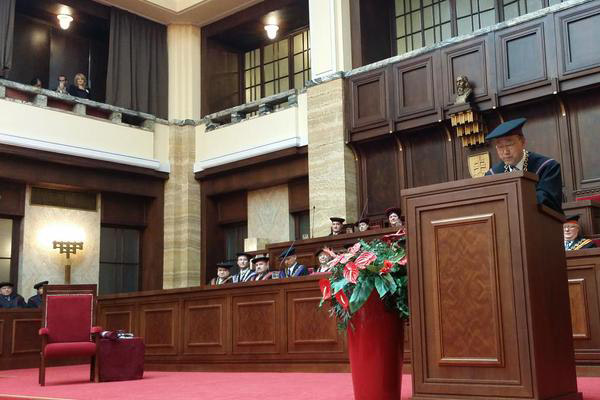| Newsletter / |
|
70th Anniversary of the UN – Current and Further Challenges Award of an Honorary Decree Doctor Honoris Causa to H.E. Ban Ki-moon October 19-20, 2015, Comenius University, Bratislava, Slovak Republic  Source and more info:http://www.un.org/apps/news/story.asp?NewsID=52302#.VidflStjFqA
The conference on the 70th anniversary of the UN was
organised under the auspices of the Deputy Prime Minister of Foreign Affairs of
the Slovak Republic, Miroslav Lajcak, and the Rector of the Comenius University
in Bratislava Karol Micieta. NISPAcee has been cooperating closely with the UN
since 2004 and serves as a Regional Centre of UNPAN (United Nations Public
Administration Network). Ludmila Gajdosova, the NISPAcee Executive Director,
was therefore invited to the conference and to the ceremony awarding the Honorary
Decree Doctor Honoris Causa to H.E. Ban Ki-moon, United Nations
Secretary-General by the Rector of the Comenius University in Bratislava, Karol
Micieta. "When the United Nations was first established, it was an
enormous gamble based on hope,” Secretary-General Ban Ki-moon told those
attending the ceremony in Bratislava. "The world was in ruins. The founders of
the United Nations knew that they had to do more than rebuild the bombed-out
buildings with bricks; they had to build a lasting institution based on universal
ideals,” he continued. Ban Ki-moon
further noted that the dramatic events in the world now "show how important the
United Nations remains today,” and that the global community has reached a
"pivotal” moment in history. "The United Nations has saved countless lives –
but wars still rage. Displacement is higher than at any time since the Second
World War. The dangers are serious – but the world is responding,” he insisted,
mentioning the new Sustainable Development Goals (SDGs) adopted by the UN General
Assembly in September 2015, which aim to create a life of dignity for all
people by 2030. As he stressed, we do not have a plan B because we do not have
a planet B, and therefore the SDGs are people-centred and planet-friendly.
Many distinguished speakers at the conference referred to this statement.
More about the ceremony and the visit to Slovakia: http://www.un.org/apps/news/story.asp?NewsID=52302#.Vi4goSsWlqB
The conference which followed the ceremony was organised on the occasion of the 70th anniversary of the establishment of the United Nations, an international milestone committed to prevent war, strengthen human rights and develop social progress and friendly relations among nations. The conference thematically followed the message of Ban Ki-moon: "It is a good opportunity to focus attention where the United Nations and the international community as a whole, needs to redouble its efforts to meet the current and the future challenges across the three pillars of its work: peace and security, development and human rights.” The programme of the conference was divided into 4 panels: Slovakia and the United Nations; Role of the United Nations in the Modern World; Migration and Current Challenges; and the UN Charter and the Reform of the Organisation. Speakers and participants included academicians as well as practitioners and politicians dealing with international affairs and international law. All the speakers confirmed the vital role of the UN in peace building, sustainable development, and human rights strengthening worldwide. The challenges of the present era as war conflicts, security, climate change and global warming, food safety, financial and economy crises, massive migration, humanitarian disasters, geopolitical changes, digitalisation and protection of privacy etc. were discussed in depth. International organisations such as the UN and the OECD play a crucial role in coping with these challenges. Finally, the UN Charter and Security Council and their necessary reforms were discussed.
SDGs confirm that it is possible to agree on common goals, but these are a combination of challenges. The goals are not sufficient; they require an agreement and collaboration in finding solutions as stated by the UN representative to Slovakia, Dusan Chrenek. It was agreed that professional public administration and open democratic governance play a crucial role in these processes. What this means in theory and practice and how to contribute to the SDGs’ successful achievements therefore seem to be an additional challenge for NISPAcee and its members. |